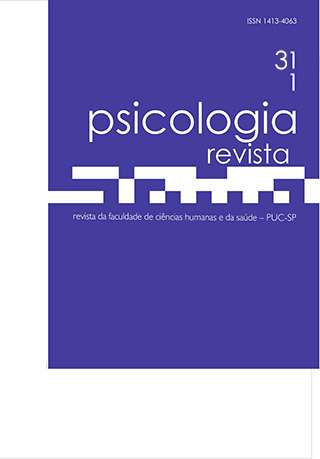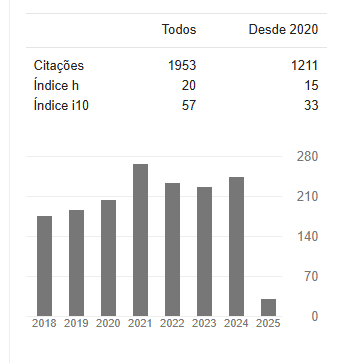Relationship between adherence to meritocratic beliefs and family income
DOI:
https://doi.org/10.23925/2594-3871.2022v31i1p158-179Keywords:
meritocracy, ideology, stratificationAbstract
Meritocracy can be considered an ideology that cooperates to justify the inequalities between the classes existing in the economic system. This is done by valuing characteristics such as competitiveness, ability and individual effort, disregarding historical, cultural and socioeconomic factors. The aim of the research was to characterize adherence to meritocratic beliefs, linking the responses obtained to the social conditions of participants. A sample of 1.233 adults completed a structured interview, indicating the degree of agreement with three sentences regarding the role of individual effort for success, the relationship between ability and remuneration, and social inequality. The results indicated that the income of the individuals is associated with the perception of the meritocratic logic, since subjects with higher incomes tended to question the generalizations, but they did not stop adhering to their logic with vehemence, valuing effort and maintenance of wage differences based on social value added to certain skills. In contrast, subjects with less access to resources have shown to believe in meritocracy with less questioning, thus emerging the ideological characteristics of meritocracy and the dominant conceptions of more affluent social classes.
References
Barbosa, L. (2003). Igualdade e Meritocracia: a ética do desempenho nas sociedades modernas (4ª ed). Rio de Janeiro: Editora FGV.
Beauvois, J-L. & DUBOIS, N. (1988). The norm of internality in the explanation of psychological events. European Journal of Social Psychology, 18(1), 299-316. doi: 10.1002/ejsp.2420180402
Brasil. Ministério da Saúde. Conselho Nacional de Saúde. (2016). Resolução n.510. Disponível em: http://conselho.saude.gov.br/resolucoes/2016/Reso510.pdf. Acesso em 02 jul. 2019.
Celarent, B. (2009). The Rise of the Meritocracy: 1870–2033 by Michael Young. American Journal of Sociology, 115(1), 322-326. Disponível em: http://www.jstor.org/stable/10.1086/605763?origin=JSTOR-pdf.
Chauí, M. (1987/2008). O que é ideologia (13ªed). São Paulo: Brasiliense.
De Borba, E. (2017). Sobre a Meritocracia: uma investigação (Dissertação de Mestrado, Instituto de Filosofia, Universidade Federal de Florianópolis, Florianópolis). Recuperado de: https://repositorio.ufsc.br/handle/123456789/178103
Eagleton, T. (1997). Ideologia: Uma introdução. São Paulo: Unesp/Boitempo.
Figueiredo, J.G. (2013). Desigualdade social e capitalismo: os limites da igualdade sob a ordem burguesa. In: Jornada internacional de políticas públicas (1-9). São Luís, Maranhão/Brasil. Disponível em: http://www.joinpp.ufma.br/jornadas/joinpp2013/JornadaEixo2013/anais-eixo4-desigualdadessociaisepoliticaspublicas/desigualdadesocialecapitalismo-oslimitesdaigualdadesobaordemburguesa.pdf. Acessado em: 02 jul. 2019.
Fiske, S.T. & Cuddy, A.J.C. (2005). Stereotype content across cultures as a function of group status. In: GUIMOND, Serge (Org.). Social comparison and social psychology: Understanding cognition, intergroup relations and culture (pp. 249-263). Cambridge: Cambridge University Press.
Flanagan, C.A., Campbell, B., Botcheva, L., Bowes, J., Csapo, B., Macek, P., & Sheblanova, E. (2003). Social class and adolescents’ beliefs about justice in different social orders. Journal of Social Issues, 59(4), 711-732. doi: 10.1017/CBO9780511584329.013
Freitas, H., Oliveira, M., Saccol, A.Z. & Moscarola, J. (2000). O método de pesquisa Survey. Revista de Administração, 35(3), 105-112. Recuperado de: http://www.ufrgs.br/gianti/files/artigos/2000/2000_092_RAUSP.PDF
Giddens, A. (1999). As Consequências da Modernidade. São Paulo: Editora UNESP.
Hout, M. (2008). How class works: objective and subjective aspects of class since the 1970s. In: Lareau, A. & Conley, D. (Orgs.). Social class: how does it work? (pp.25-64). New York: Russell Sage.
Kreimer, R. (2000). Historia del mérito. Disponível em: http://www.oocities.org/filosofialiteratura/
Latané, B. (1981). The psychology of social impact. American Psychologist, 36(4), 343-356. Recuperado de: https://psycnet.apa.org/record/1982-01296-001
McNamee, S.J. & Miller JR, R.K. (2014). The Meritocracy Mith. (3ªed). Maryland: Rowman & Littlefield Publishers.
Reynolds, J. & Xian, H. (2014). Perceptions of meritocracy in the land of opportunity. Research in Social Stratification and Mobility, 36(1), 121-137. doi: 10.1016/j.rssm.2014.03.001
Ross, L. (1977). The intuitive psychologist and his shortcoming: distortions in the attribution process. Advances in Experimental Social Psychology, 10(1), 173-22. doi: 10.1016/S0065-2601(08)60357-3
Smith, A. (1999). Teoria dos Sentimentos Morais (1723-1790). São Paulo: Martins Fontes.
Thompson, J.B. (2011). O conceito de ideologia. In: Thompson, J.B. Ideologia e cultura moderna: Teoria social crítica na era dos meios de comunicação de massa (pp.71-99). (9.ed). Petrópolis: Vozes.
Wachelke, J. (2017). Ideologia nas Opiniões de Estudantes de Ensino Médio sobre Sucesso no Trabalho. Psicologia: Ciência e Profissão, 37(3), 652-668. https://doi.org/10.1590/1982-3703004062016
Wachelke, J. (2018). Posição social de adolescentes e a crença no mundo justo. Arquivos Brasileiros de Psicologia, 70(2), 65-80. Recuperado de: http://pepsic.bvsalud.org/scielo.php?pid=S1809-52672018000200006&script=sci_abstract&tlng=es&fbclid=IwAR1_msbwdjzn2gU3cJ5M9WaqV4Bfvfds0Pw2soTxLLduZd067TGgv_3gDkE
Young, M. (1958). The Rise of Meritocracy 1870-2033: an essay on education and equality. United Kingdom: Peguin Books.
Zizek, S. (1996). Introdução: o espectro da ideologia. In: Zizek, S (Org.). Um mapa da ideologia (pp. 7-38). Rio de Janeiro: Contraponto.
Downloads
Published
How to Cite
Issue
Section
License
Copyright (c) 2022 Amanda Borba Ramos Silva, João Fernando Rech Wachelke

This work is licensed under a Creative Commons Attribution 4.0 International License.














